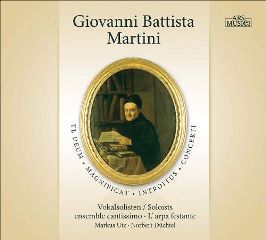Giovanni Battista Martini – Te Deum, Magnificat, Concerti (2010)
Giovanni Battista Martini – Te Deum, Magnificat, Concerti (2010)

1) Magnificat (08:20) Concerto con Violini, Oboe obbligate, Trombe e Violoncello obbligato 2) 1. Allegro moderato (04:03) 3) 2. Lento (02:47) 4) 3. Allegro (02:48) 5) Introitus in festo Sacrorum Stigmatorum (05:44) 6) Introitus in festo Translationis (06:02) Concerto con Cembalo obbligato (o.J.) 7) 1. Allegretto (04:35) 8) 2. Lento (03:46) 9) 3. Allegro (02:59) 10) 4. Balleto spiritoso (01:44) Te Deum in D-Dur für 8st. Chor und Orchester 11) Te Deum laudamus (03:32) 12) Te gloriosus Apostolorum (01:49) 13) Te per orbem terrarum (03:22) 14) Te ergo quaesumus (02:53) 15) Et rege eos (01:30) 16) Dignare Domine (02:57) Iris-Anna Deckert - soprano Alex Potter - alto Manfred Bittner - bass Oscar Milani - harpsichord Ensemble Cantissimo (choir) L'Arpa Festanto (on period instruments) Markus Utz - choir director, conductor Norbert Düchtel - conductor
For such a familiar name in music history -- he was the "Padre Martini" who taught the young Mozart in Bologna -- Giovanni Battista Martini has suffered comparative neglect from performers and recording companies. This 2006 live recording from Germany's Ars Musici label, featuring the veteran south German historical-instrument group L'Arpa Festante and the small Ensemble Cantissimo choir, makes a reasonable contribution to filling the voice. The recording features two separate conductors: one, Markus Utz, leads the choral works, and the other, Norbert Düchtel, conducts the two instrumental concertos included. This is appropriate, for on the evidence of these pieces Martini's style, unlike Vivaldi's, bifurcated between sacred and secular music. The sacred pieces, of which the concluding rather Handelian Te Deum is a good example, come close to what you would expect of a composer who became a renowned counterpoint teacher; they are contrapuntal in texture, sober, and rather formal. The two concertos are the most progressive and most intriguing pieces on the disc. The undated Keyboard Concerto in F major (tracks 7-10) is a melodic early example of the style, with clear differentiation between solo and tutti material and a very familiar-sounding sequence of movements at least until you come to short "Balleto spiritoso" finale. Martini was also the teacher of Johann Christian Bach, and it was probably through this channel that the basic major-key Mozart concerto mood was formed. The Concerto for two oboes, cello, and strings with trumpet in D major (tracks 2-4), from 1745, is an experimental piece that seems to take off from where some of the more unusual Vivaldi concerto groupings leave off, with various novel ways of matching themes to instrumental forces. The Ensemble Cantissimo, with soloists drawn from the group, is one of the impressively warm and homogenous regional vocal ensembles that mark the German scene, although the instrumental work lacks a degree of liveliness. Booklet notes, despite the presence of English in the tracklist, are in German and Italian only, and the Latin texts of the choral works are translated only into German. ---James Manheim, AllMusic Review
download (mp3 @320 kbs):








